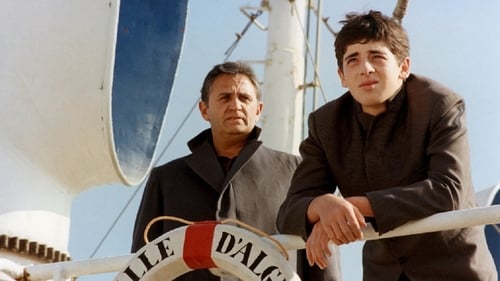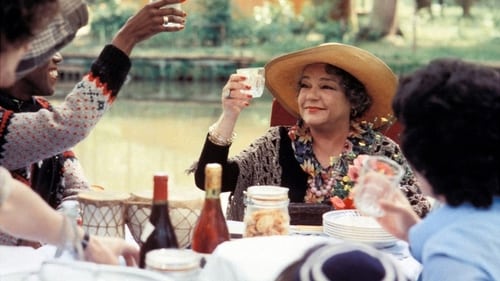Mohamed Zinet
出生 : 1932-01-16, Alger, Algérie
死亡 : 1995-04-10
![ザ・カンニング[IQ=0]](https://moviedb.kr/index.php/image/w500/1Dhp3oJ3xnqmxHjkoUZpZJN283t.jpg)
Mustapha le terroriste
大学入学資格試験(バカロレア)の合格率ゼロという不名誉な結果に終わったルイ14世予備校のルシェ校長は、生徒たちを厳しく指導することを決意。ところが集まったのは、恋人と一緒の予備校通いを喜ぶジュリアン、某国元首の頼りない後継者オレノ、校則無視でやりたい放題のベベルら一筋縄ではいかない連中ばかり。こうして始まる生徒と教師たちの受験勉強を巡る攻防。だが、生徒たちのいたずらは日に日にエスカレートしてゆく。

Le porteur
A shady Parisian tries to take advantage of a family of French-descended Algerians forced to move to France.

Kadir Youssef
Madame Rosa lives in a sixth-floor walkup in the Pigalle; she's a retired prostitute, Jewish and an Auschwitz survivor, a foster mom to children of other prostitutes. Momo is the oldest and her favorite, an Algerian lad whom she raises as a Muslim. He asks about his parents; she answers evasively. As she ages and takes fewer children, Momo must do more for her; as money is tight, he tries to earn pennies on the street with a puppet. He's a beautiful man-child, and Madame Rosa makes him promise never to sell himself or become a pimp. A film editor, Nadine, befriends him, and his father appears as well. Madame Rosa reaches her last days in fear of hospitals, and Momo must act.

Writer
Originally commissioned by the city of Algiers to promote tourism, Mohamed Zinet’s Tahia ya Didou blends documentary with fiction to create a poetic, acerbic and rapturous portrait of the director’s native city. The camera travels freely, through the port, market, streets and cafés, capturing everyday people, some of whom recur frequently enough to seem like protagonists. The nominal plotline follows a French tourist couple’s leisurely visit to the city, the man having previously served in the army during the Algerian war. As they walk around, his comments betray his mindset’s racist colonial prejudices, while his wife reiterates asinine clichés. Their unhurried wandering is interrupted when he comes across a blind man and realises that he tortured him during his army service. The film is punctuated with punchy sequences that show a poet named Momo delivering verse as an elegy for Algiers.

Hassan
Originally commissioned by the city of Algiers to promote tourism, Mohamed Zinet’s Tahia ya Didou blends documentary with fiction to create a poetic, acerbic and rapturous portrait of the director’s native city. The camera travels freely, through the port, market, streets and cafés, capturing everyday people, some of whom recur frequently enough to seem like protagonists. The nominal plotline follows a French tourist couple’s leisurely visit to the city, the man having previously served in the army during the Algerian war. As they walk around, his comments betray his mindset’s racist colonial prejudices, while his wife reiterates asinine clichés. Their unhurried wandering is interrupted when he comes across a blind man and realises that he tortured him during his army service. The film is punctuated with punchy sequences that show a poet named Momo delivering verse as an elegy for Algiers.

Director
Originally commissioned by the city of Algiers to promote tourism, Mohamed Zinet’s Tahia ya Didou blends documentary with fiction to create a poetic, acerbic and rapturous portrait of the director’s native city. The camera travels freely, through the port, market, streets and cafés, capturing everyday people, some of whom recur frequently enough to seem like protagonists. The nominal plotline follows a French tourist couple’s leisurely visit to the city, the man having previously served in the army during the Algerian war. As they walk around, his comments betray his mindset’s racist colonial prejudices, while his wife reiterates asinine clichés. Their unhurried wandering is interrupted when he comes across a blind man and realises that he tortured him during his army service. The film is punctuated with punchy sequences that show a poet named Momo delivering verse as an elegy for Algiers.

“Monangambeee” was a rallying cry used by activists during Angola’s anti-colonial liberation struggle to gather villages together. The film of the same title addresses Portuguese arrogance towards Angolan culture. Sarah Maldoror draws on a novella by José Luandino Vieira, the story of a political prisoner, to make a film about humiliation, solidarity and resistance.
![ザ・カンニング[IQ=0]](https://moviedb.kr/index.php/image/w500/1Dhp3oJ3xnqmxHjkoUZpZJN283t.jpg)





